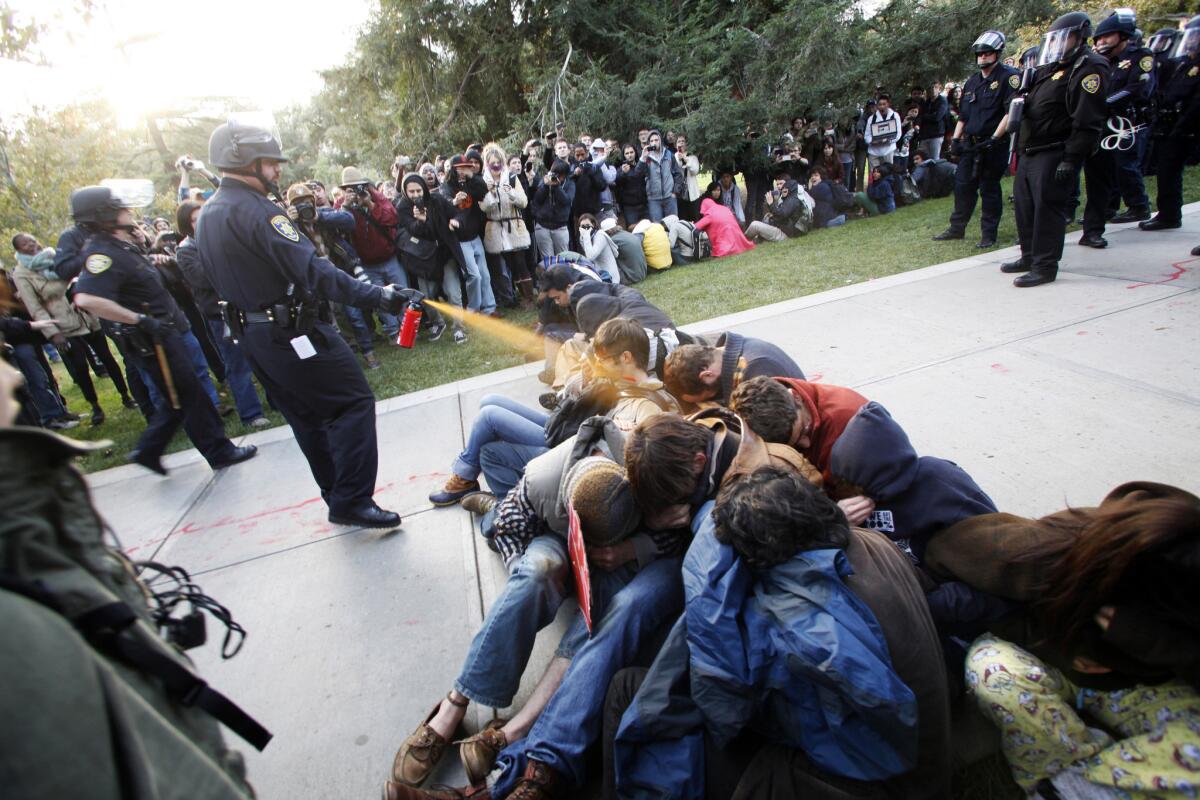UC Davis chancellor apologizes for Internet scrubbing controversy

University of California Davis police Lt. John Pike douses student protesters with pepper spray in 2011.
- Share via
Linda Katehi, the chancellor of UC Davis, has apologized for the university’s hiring of image consultants to bury Internet references to a pepper-spraying incident of student protesters by campus police and has promised a series of public forums to answer questions.
“The university’s identity has been shaken by a series of highly publicized missteps,” Katehi said in a statement released late Monday amid calls for her resignation. “Some were my own doing. All occurred under my watch. For that, I sincerely apologize.”
In a widely criticized November 2011 incident, a university police officer dressed in riot gear sprayed peaceful protesters. Images and video of the incident quickly went viral and triggered nationwide controversy and generated calls for the chancellor to step down.
Documents obtained by the Sacramento Bee showed that the school, determined to improve its image and that of Katehi, paid at least $175,000 to a consultant to clean up its online reputation.
In her statement, Katehi said the university’s Office of Strategic Communications “hired outside firms specializing in what is known as ‘search engine optimization’” to improve the school’s image following the “highly regrettable” police episode.
Katehi cited the “importance of philanthropy to UC Davis” and the need to make sure people searching for information about the school got a “complete picture” of its achievements as reasons for hiring the image consultants.
During Katehi’s tenure, the university increased its communications budget by $1.6 million, including $800,000 allocated for new and existing employees to work on social media, Web development, videography and news. The school also paid $1 million for a statewide advertising campaign highlighting its contributions to California agriculture, she said.
None of the costs for consultants or the advertising campaign were paid from state general fund appropriations or student tuitions and fees, she said.
“In hindsight, we should have been more careful in reviewing some of the more unrealistic and ridiculous scope-of-work claims in the written proposals of our outside vendors,” Katehi said. “What might be accepted industry hyperbole in the private public relations world falls far beneath the high standards of a public institution of higher learning.”
Katehi said none of the communications actions were intended to “erase online content or rewrite history” and said the university has implemented a series of reforms, including an “overhaul” of its police department, since the pepper-spraying episode.
Police at first contended that pepper spray was the most appropriate tool they had on hand to deal with what they described as an unruly mob encircling the officers. At the time, the Occupy Wall Street movement had spilled onto college campuses, combining with student anger over rising tuition and cuts to higher education to spur protests and sit-ins.
However, a UC report from a task force appointed by Katehi and then-UC President Mark Yudof in April 2012 declared that the pepper spraying violated policy. The report rebutted campus police claims that the protesters, who had pitched tents on a UC Davis quad, posed a violent threat.
In 2013, John Pike, the former UC Davis police officer who sprayed the students, received $38,055 in workers’ compensation after claiming he suffered depression and anxiety as a result of the public outcry.
Pike, who had filed for the compensation from the UC system, also cited stress from death threats he received after the incident. He was fired in July 2012 after being on paid administrative leave for eight months.
The University of California student association on April 15 called on Katehi to resign.
The revelations about the image consultants come as Katehi has drawn increasing criticism for other actions such as accepting paid outside board positions, including serving on the board of John Wiley & Sons, a college textbook publisher, from 2012 to 2014.
On April 14, Assemblyman Mike Gatto (D-Glendale) said Katehi should resign.
“The chancellor serving on the board of a textbook company was sufficient enough grounds to suspect that the best interests of the students weren’t being served,” Gatto said in a statement. “But the recent disclosure that the university made substantial, questionable PR expenditures cemented it in my mind.”
Follow me at @haileybranson / Google+
ALSO
L.A. to pay $750,000 to settle suit alleging sexual assault by police
Homeless measures take center stage in Mayor Garcetti’s 2016 budget proposal
Los Angeles and Bakersfield top list of worst air pollution in the nation
More to Read
Sign up for Essential California
The most important California stories and recommendations in your inbox every morning.
You may occasionally receive promotional content from the Los Angeles Times.











